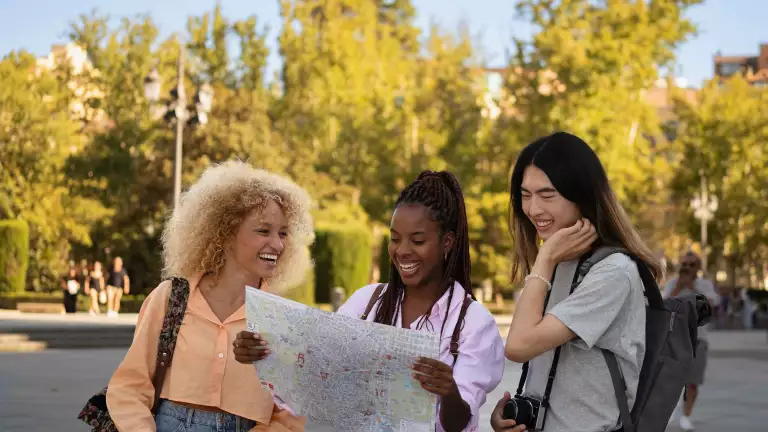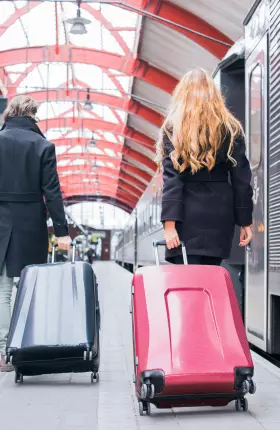An Australian deep-dive on BCG’s Global 2025 Report, Unpacking the $15 Trillion Opportunity in Leisure Travel, informed by consumer surveys across 11 countries.
Spending on leisure travel is set to triple, reaching $15 trillion by 2040, driven predominantly by domestic and regional travel, which will constitute over 90% of total spending. Travellers are increasingly younger and digitally savvy, and seeking richer, purpose-driven experiences such as wellness retreats, cultural exploration, culinary tourism and flexible ‘bleisure’ trips combining business and leisure. Understanding and adapting to these trends, as well as adopting AI across the travel journey, is critical for Australia’s leisure travel industry to remain globally competitive and take advantage of this growing market. We share findings from our global review of leisure travel and next steps for airlines, travel agents, agencies and tourism boards.
Australia’s $277 Billion Leisure Travel Industry
Australia’s leisure travel industry generated $277 billion in spending in 2024, representing about 10% of our GDP – and spending is expected to continue growing 3–4% per year, reaching $370 billion by 2035 (see Exhibit 1).
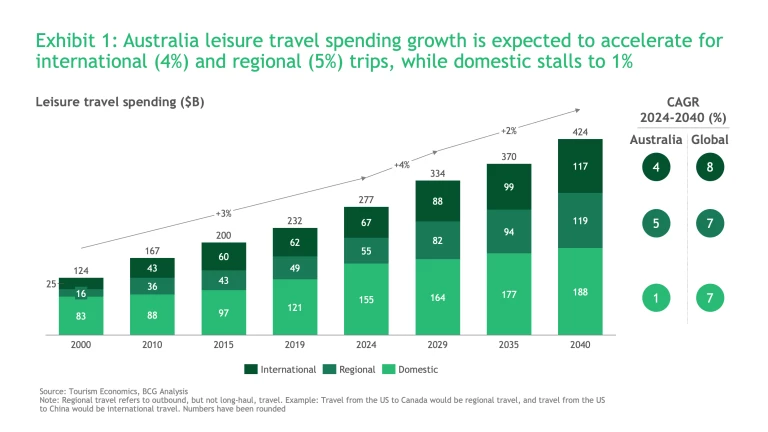
Australians were among the top 10 leisure travellers in 2024, with 122 million overnight stays. However, the global outlook is expected to evolve by 2040. Current projections indicate that China, South Korea and Japan will move up or enter the top 10 as their citizens increase both domestic and international travel. Growth in China is expected to be particularly strong, with projected overnight stays reaching approximately five times 2024 levels. (see Exhibit 2)
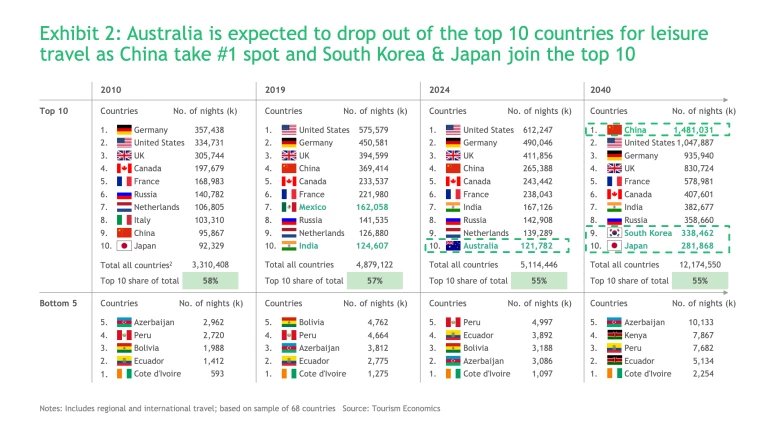
The growth in Asia Pacific provides a huge opportunity for the Australian leisure travel industry to attract more regional travellers to Australia. However this will require the industry to innovate to meet evolving traveller preferences.
Stay ahead with BCG insights on travel and tourism
Imperative 1: Innovate and Align to the Evolving Expectations of Travellers
The next wave of global leisure travel will be driven by travellers from emerging markets like China, India, Saudi Arabia, Cambodia, the Philippines, Bolivia and Venezuela. Growth will come from Millennials and Gen Z, who are more inclined to travel and spend than older generations. And while most travel spending will be domestic (77%), followed by regional travel, international travel spending is expected to grow the fastest until 2040, at an average of 8% per year.
We observe that international travellers are increasingly expecting:
- Authentic experiences: Travellers are prioritising destinations that offer immersive, culturally authentic experiences, necessitating well-curated local tours and activities.
- Premium, personalised service: Premium travellers are seeking enhanced experiences that include personalised services, particularly in health and wellness, gastronomy and cultural interactions.
- Digital-first interactions: Travellers expect seamless digital interactions from inspiration to booking, highlighting the critical need for intuitive digital tools and platforms.
Australian travellers’ expectations are also evolving:
- Purpose-driven experiences: Australians are seeking wellness retreats, culinary tourism and culturally enriching travel that aligns with their values and lifestyles (see Exhibit 3).
- Solo and multi-generational travel: Australia's large number of solo travellers (17%) require tailored, individual offerings, while growing multi-generational groups need flexible accommodation and diverse activity options.
- Flexible ‘bleisure’ options: With 29% of Australians planning ‘bleisure’ trips that mix business and leisure, there's significant demand for travel experiences that integrate work amenities, flexibility and longer stays.
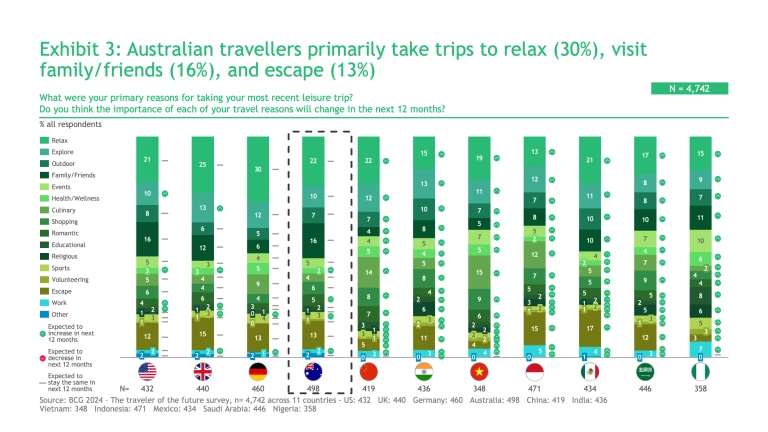
Imperative 2: Use AI to Deliver Premium, Personalised Experiences
Travellers expect to make even greater use of AI when it comes to planning, booking and managing their trips. Large language models (LLMs) are evolving into comprehensive travel agents, capable of planning entire itineraries. Already, travellers are using advanced AI systems like ChatGPT’s Operator – where ChatGPT acts as an autonomous agent, orchestrating everything from itinerary recommendations to bookings. Travellers are also increasingly booking in the AI environment, whether using AI functionalities provided by online travel agents, new AI travel platforms or LLMs.
The global travel industry is swiftly leveraging AI to offer premium, personalised experiences that travellers could previously only receive in face-to-face interactions with travel agents:
- Enhanced personalisation: Companies are offering hyper-personalised travel experiences, creating tailored itineraries and recommendations aligned with traveller preferences, significantly elevating customer satisfaction.
- Conversational interfaces: AI-powered conversational agents provide real-time, intuitive interactions that replicate the depth and quality of traditional travel agents, making planning and booking seamless and interactive.
- Operational efficiency: AI-driven customer support solutions streamline service delivery, proactively managing traveller experiences, reducing response times and handling complex queries efficiently.
Only 17% of Australian travellers are using AI tools for travel today, reflecting slower adoption by the industry. On the other hand, in emerging markets like China, India and Indonesia, 50–65% of travellers are already using AI tools for travel (see Exhibit 4).
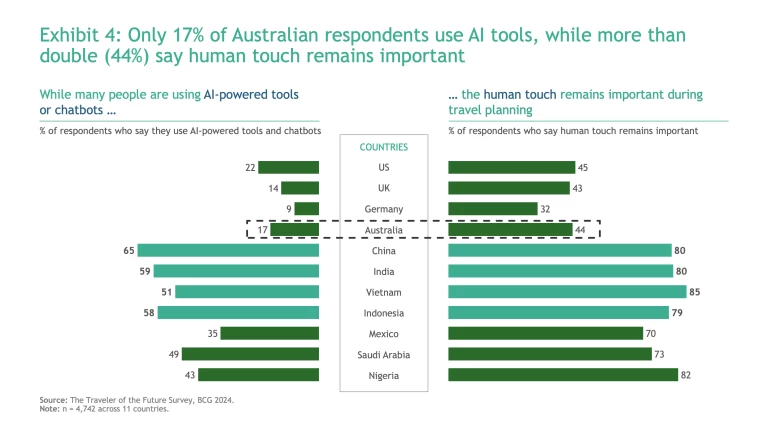
Interestingly, the growing appreciation of AI does not negate the value of human interaction for travellers. In fact, in countries where AI is considered particularly valuable for travel planning, human interaction is also especially important to travellers. Smart integration and handoffs between technology and the human touch will best meet travellers’ needs. Winning platforms will combine AI-powered simplicity with personalisation, cultural relevance and hybrid engagement.
Examples of AI innovation in the travel customer journey
Mindtrip is designed to simplify and enhance the process of planning and booking travel. Using generative AI, Mindtrip creates unique itineraries for travellers, based on their preferences, combining transport, accommodation, dining and local experiences. As it evolves, it will streamline travel logistics, apply deeper personalisation and become more adaptable.
Perplexity and TripAdvisor have partnered to provide personalised hotel recommendations through a conversational AI platform, leveraging Tripadvisor’s 1 billion user reviews and contributions. Search results are intuitive, explain why a hotel has been recommended and are directly bookable. This initiative marks the beginning of a multi-year expansion into broader travel experiences.
United Airlines is using AI to proactively support travellers throughout their journey with lockscreen notifications and natural language interactions. The AI system provides timely, useful directions for navigating airports and managing disruptions such as flight delays or gate changes.
The Roadmap to Secure Australia’s Position as a Leader in Leisure Travel
Ensuring Australia remains competitive in the global leisure travel industry requires clear, actionable strategies tailored for each stakeholder in the travel ecosystem:
- Airlines: Revisit the flying and ground experiences with a strong focus on health and wellbeing, particularly for premium travellers. Offer personalised sleeping and dining options in premium cabins to ensure passengers land feeling their best.
- Online travel agencies: Rapidly adopt AI technologies to remain competitive; agencies that cannot offer intuitive, AI-supported customer experiences – from exploration to booking and servicing – risk obsolescence.
- Travel agents: Emphasise the human touch by curating unique, personalised travel experiences that leverage deep local insights and exclusive access, differentiating from purely digital alternatives.
- Tourism boards: Pivot marketing investment towards future-focused themes such as wellness, gastronomy and culture, while assisting local tourism businesses to enhance their AI capabilities and digital engagement strategies.
By embracing these strategic imperatives and swiftly adapting to evolving traveller expectations and technologies, Australia’s leisure travel industry can secure and expand its position as a global leader.
